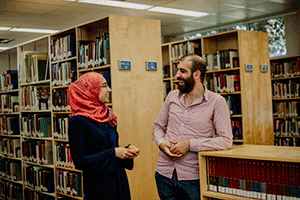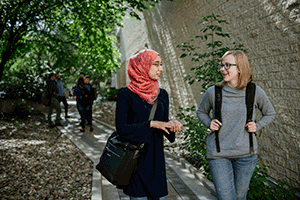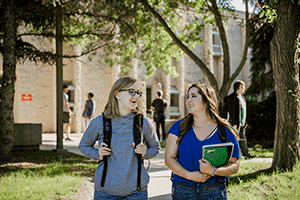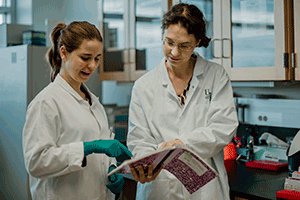Ready to learn more?
Get all the details straight to your inbox!

Luther students can register in Arts, Science, or Media, Art, and Performance. Luther students are U of R students and receive a U of R degree.

The Luther Library has over 24,000 items in its collection, 5,000 books checked out per year, and 7,000 students who come through its door per month.

Luther College students are eligible for nearly $100,000 in academic awards – in addition to scholarships and bursaries awarded by the U of R.

You can book a tour of Luther College, the U of R campus, and our student residence, The Student Village at Luther College, any time throughout the year. Contact our Recruitment Office at 1-306-206-2117.

Luther College is a great choice for high school to university transition. Enjoy all the benefits of a larger campus, without feeling lost in the crowd. Our community is full of caring mentors and peers to ensure a positive student experience.

Free enrolment counselling support and invaluable one-on-one academic advising are available for all programs at Luther College.

Living in The Student Village at Luther College, our student residence, comes with a choice of healthy, nutritious meal plans. That means no grocery shopping, no meals to cook, and no dirty dishes to worry about. You can focus on your studies and wellness!

Luther College offers Bundles programs that group together first-year students and classes to give you a great start and help ease the transition from high school to university.
Get all the details straight to your inbox!
The purpose of this program is to provide students with a basic structure for decisions about sustainability and crafting sustainable livelihoods and lifestyles. Implemented in the Faculty of Arts, a Certificate in Sustainability is open to students enrolled in all faculties, including the professional faculties. Students would need to choose one course from each of the six course categories outlined below with no more than three courses being chosen from any given discipline (to ensure exposure to a range of disciplines and methods).
1. The Sustainability Problem: Courses in this area provide students with a general introduction to the idea of sustainability/sustainable development (and related concepts) that have emerged in relation to a common problem facing humanity, namely, that current human activities have eroded the natural resources upon which these very human activities depend if they are to continue into the future. Students gain a general appreciation of the normative goals sustainability seeks to fulfill and its recognition of empirical constraints, particularly those of natural systems, that limit or restrict the ways in which these goals might be fulfilled.
2. Dimensions of Human Sustainability: Courses in this area explore important elements of human well-being and quality of life and the implications for life within a global community of each person being able to live a decent, dignified life. Implied social constraints and responsibilities found in different theories of justice (e.g., political justice, social justice, distributive justice, intra and inter-generational justice) are potentially explored along with associated normative principles of participation by individuals and communities, especially indigenous communities. The implications of a lack of well-being in specific areas including diverse forms of poverty and vulnerability and key indicators of well-being can also be explored.
3. Dimensions of Environmental Sustainability: Courses in this area provide students with an understanding of complex natural systems at diverse biological scales. The ethical status of natural objects and systems that potentially shape and constrain human interaction with the natural environment are potentially examined. What may be required to sustain these systems over time (such as promoting ecosystem resilience and biodiversity), key indicators of environmental sustainability, and an understanding of how these systems may generally be degraded, especially by patterns of human activity, are also potentially explored.
4. Human Sustainability Options: Courses in this area explore specific problems and issues critical to sustaining human communities and factors that have emerged as priorities in sustainability discourse related to social, cultural, and economic sustainability. Strategic options related to advancing sustainability in the given area(s) are explored.
5. Environmental Sustainability Options: Courses in this area explore specific problems and issues critical to sustaining environmental systems (living and non-living) that have emerged as priorities in sustainability discourse related to environmental sustainability. Strategic options related to advancing sustainability in the given area(s) are explored.
6. Sustainability in Practice: Courses in this area provide students with an opportunity to practically address sustainability issues in a grounded way within a given community (e.g. local living laboratories) and/or organizational context (e.g. policies and/or programs). Practical sustainability projects employing specific forms of community service, engagement and/or research are employed. Knowledge, capabilities, and skills appropriate to engaging sustainability in the particular context (e.g. qualitative and quantitative research tools, policy analysis, report writing/presentations, use of technologies) are important parts of such a course.
|
Credit Hours |
Certificate in Sustainability required courses |
|
3.0 |
One approved elective from the Sustainability Problem course list |
|
3.0 |
One approved elective from the Dimensions of Human Sustainability course list |
|
3.0 |
One approved elective from the Dimensions of Environmental Sustainability course list |
|
3.0 |
One approved elective from the Human Sustainability Options course list |
|
3.0 |
One approved elective from the Environmental Sustainability Options course list |
|
3.0 |
One approved elective from the Sustainability in Action course list |
|
At least one class in the certificate must be at the 300-level. No more than three classes from a single department can be counted in the certificate. At least one class in the certificate must involve a semester-long community engagement project (see approved electives course lists). No more than two classes from a student’s major can be counted in the certificate. |
|
|
18.0 |
Total - 65% PGPA required |
|
Classes incorporating community service through Campion Engaged Learning are indicated with a *. |
|
|
1. The Sustainability Problem |
ENST 200/GEOG 226 - Introduction to Environmental Studies/Issues |
|
2. Dimensions of Human Sustainability |
INDG 100 - Introduction to Indigenous Studies |
|
3. Dimensions of Environmental Sustainability |
BIOL 150 - Biological Principles |
|
4. Human Sustainability Options |
ANTH 340 - Anthropology and Contemporary Human Problems |
|
5. Environmental |
BIOC 200 - Bioactive Plants & Culture (prereq: one of the following courses at the 100-level - ANTH, BIOL, CHEM, ENGL, INDG, or PSYC) |
|
6. Sustainability in Practice |
ARTS 301 - AIESEC Global Internship |
For more information, please contact Dr. Roger Petry, Professor of Philosophy at Luther College at the University of Regina, at 1-306-585-5295 or roger.petry@uregina.ca.